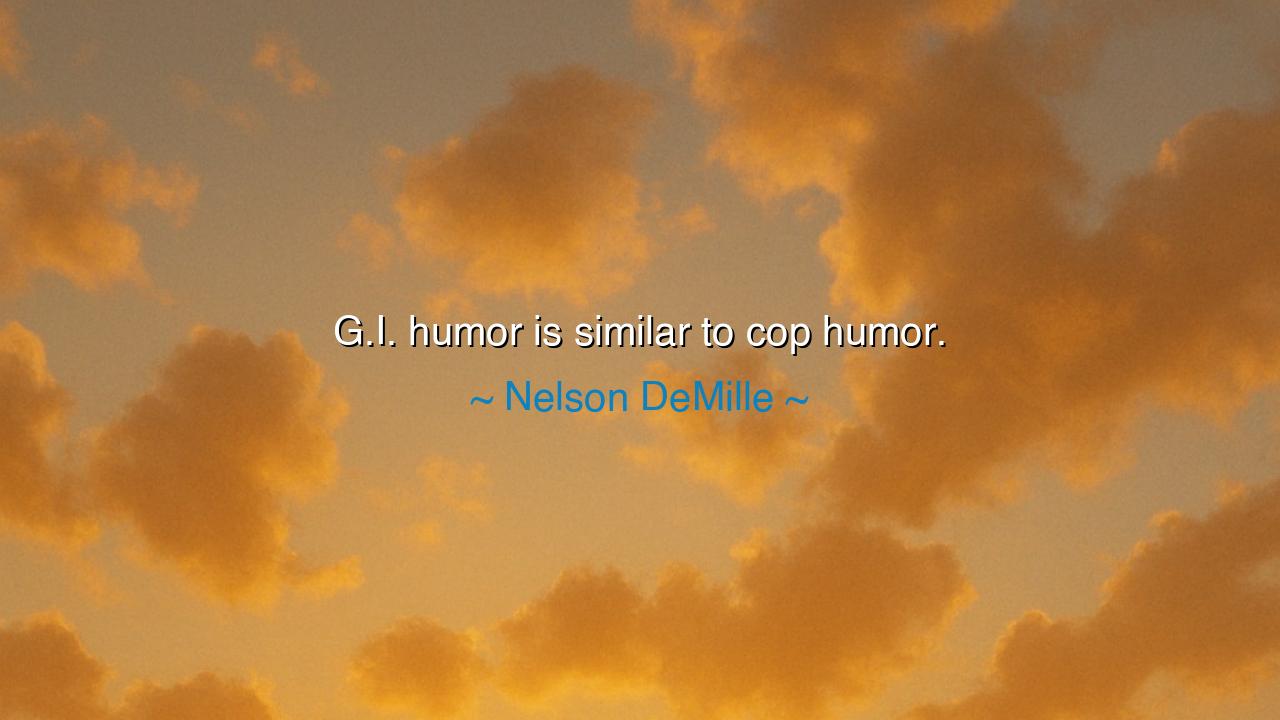
G.I. humor is similar to cop humor.






When Nelson DeMille said, “G.I. humor is similar to cop humor,” he spoke of a truth that lies deep within the human heart — that laughter is a weapon, a shield, and a medicine for those who walk daily through the valley of danger. In these few words, he captured something ancient and sacred: the power of humor to preserve the spirit amid chaos. Soldiers and police officers — the G.I. and the cop — both stand on the thin edge between life and death. Their humor, dark and defiant, is not the laughter of the careless, but of the brave, those who have looked upon the abyss and refused to be swallowed by it.
This kind of humor is born not in comfort, but in struggle. It is the laughter that arises in the mud of battlefields and the back alleys of cities — laughter that mocks fear, not because fear is gone, but because it must be mastered. The G.I., standing in a foreign land under fire, and the cop, patrolling a restless street at midnight, both carry a weight few can understand. To them, humor becomes a form of resilience, a way to reclaim humanity in places where humanity is easily lost. DeMille, himself a veteran who later wrote of war and its aftermath, knew this truth intimately. He saw that such humor is not cruelty — it is survival.
The ancients, too, understood this paradox. The Spartan warriors of Greece were famous for their biting wit, even in the face of death. When told that the Persians’ arrows would blot out the sun, a Spartan replied, “Then we shall fight in the shade.” It was humor — sharp, dry, defiant — that transformed terror into strength. The same spirit lives in the jest of the soldier and the officer. Their laughter is not frivolous; it is an act of rebellion against despair. It says: Though death surrounds me, I still choose to laugh.
There is a story from World War II that echoes this truth. When Allied troops landed at Normandy and chaos erupted on the beaches, one weary G.I., crouching beside a comrade, muttered, “I should’ve stayed in college.” His companion grinned and said, “Yeah, but the dorm food’s worse.” In that moment, between gunfire and blood, a spark of humor kept their spirits alive. Such laughter does not mock suffering — it transcends it. It is a reminder that even when the body is surrounded by horror, the soul can remain unbroken.
Similarly, in the world of law enforcement, cop humor arises from the constant confrontation with humanity’s darkest moments. To the outsider, it may seem grim or irreverent, but to those within, it is a way of bearing the unbearable. The police officer who cracks a joke after a long night of tragedy is not laughing out of cruelty, but out of exhaustion — a way to release the tension that would otherwise destroy him. Like the G.I., he has seen the fragility of life too closely to take anything for granted. His humor is a kind of prayer — wordless, weary, but sacred in its defiance.
DeMille’s insight reveals that humor and courage are twins. One cannot survive long in the presence of death without finding a way to laugh at it. This is not the laughter of mockery, but of mastery. The soldier who jokes in the trench and the officer who laughs after the sirens fade are both saying: I am still human. I still feel. I still live. Their humor becomes a moral victory, proof that the darkness has not yet conquered their hearts.
So, the lesson of Nelson DeMille’s words is this: learn to laugh even in hardship, not to deny pain, but to overcome it. Humor is the flame that flickers in the storm — fragile, yet indestructible. It is the language of endurance, the echo of courage disguised as jest. The next time life brings battle or burden, remember the G.I. and the cop, standing firm, their laughter echoing through the night. For those who can still find humor amid sorrow have already claimed victory over fear itself — and that, indeed, is the laughter of the brave.






AAdministratorAdministrator
Welcome, honored guests. Please leave a comment, we will respond soon